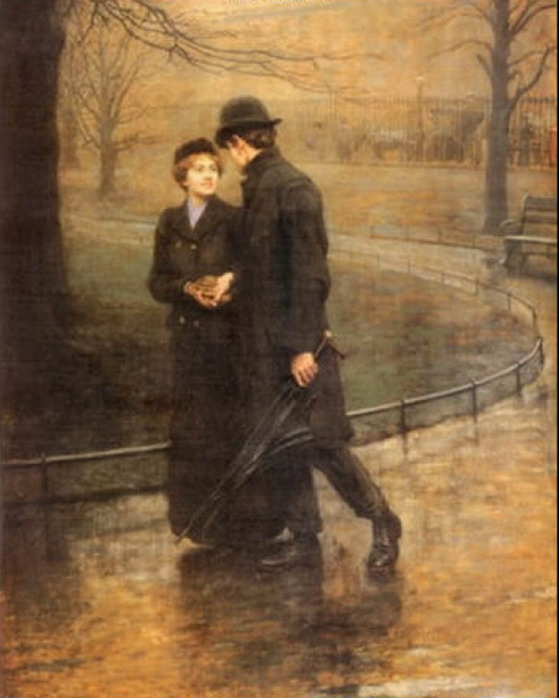ना जाने वो रेगिस्तान क्यों प्यासा है
जो अपने निचे पूरा समंदर बिछाये बैठा है
Month: October 2016
फ़ासले
फ़ासले दुरी से नही
ख़ामोशी से बढ़ते हैं!
विश्वास
मुजे तेरी आस्था पर शक़ नही
पर तेरे
विश्वास पर यकीन नही है
Rainer Maria Rilke, The Notebooks of Malte Laurids Brigge
I just don’t have the strength to write anything after reading this:
“For the sake of a single poem, you must see many cities, many people and Things, you must understand animals, must feel how birds fly, and know the gesture which small flowers make when they open in the morning. You must be able to think back to streets in unknown neighborhoods, to unexpected encounters, and to partings you had long seen coming; to days of childhood whose mystery is still unexplained, to parents who you had to hurt when they brought in a joy and you didn’t pick it up (it was a joy meant for somebody else —); to childhood illnesses that began so strangely with so many profound and difficult transformations, to days in quiet, restrained rooms and to mornings by the sea, to the sea itself, to seas, to nights of travel that rushed along high overhead and went flying with all the stars, — and it is still not enough to be able to think of all that.
You must have memories of many nights of love, each one different from all the others, memories of women screaming in labor, and of light, pale, sleeping girls who have just given birth and are closing again. But you must also have been beside the dying, must have sat beside the dead in the room with the open window and the scattered noises.
And it is not yet enough to have memories. You must be able to forget them when they are many, and you must have the immense patience to wait until they return. For the memories themselves are not important. Only when they have changed into our very blood, into glance and gesture, and are nameless, no longer to be distinguished from ourselves — only then can it happen that in some very rare hour the first word of a poem arises in their midst and goes forth from them.”
उलझा हूँ पर सुलझा हूँ
मैं बंधा हूँ पर सुलझा हूँ
में इतनी सरलता से उलझा हूँ
Consiously Unconscious
It is the conscious pain that causes grief
Not the unconscious hurt
The heart pains
Only when the conscious grief sets in
But then again
You can not be Consiously Unconscious
दो लबों का क़िस्सा है
एक मुलायम सी बात है

अपनों का क़िस्सा
हम ख़ुद से हिस्सों में मिलते हैं
जब अपने क़िस्सों में मिलते हैं!
विकसित जानवर
मानसिक तौर से इंसान
सब से विकसित जानवर है
बावजूद इसके
यह अकेला नहीं रह सकता
यह बात हम सब पर लागू होती है
बहाव
बहाव तो शीतल है
पर बहता बहुत कुछ है!
Kitna Chahiye
Yeh dukh ki baat bhi hai
Aur achcha bhi hai
Ki
Hum sabko
Sabhi kuch chahiye
‘Advent at Midlife’
I am no longer waiting for a special occasion. I burn the best candles on ordinary days.
I am no longer waiting for the house to be clean; I fill it with people who understand that even dust is sacred.
I am no longer waiting for everyone to understand me; it’s just not their task.
I am no longer waiting for the perfect children; my children have their own names that burn as brightly as any star.
I am no longer waiting for the other shoe to drop; I already did, and I survived.
I am no longer waiting for the time to be right; the time is always now.
I am no longer waiting for the mate who will complete me; I am grateful to be so warmly, tenderly held.
I am no longer waiting for a quiet moment; my heart can be stilled whenever it is called.
I am no longer waiting for the world to be at peace; I unclench my grasp and breathe peace in and out.
I am no longer waiting to do something great; being awake to carry my grain of sand is enough.
I am no longer waiting to be recognized; I know that I dance in a holy circle.
I am no longer waiting for Forgiveness. I believe, I believe.
~ Mary Anne Perrone
माज़ी (past) – हाल (present) – मुस्तक़बिल (future)
माज़ी
कम-बख़्त आज भी आता है
तो कल ही कहलाता है
हमारा माज़ी बहुत गहरा है
इसने अपने नक़्श मुस्तक़बिल में तराशें हैं
मुझे मेरा माज़ी (past)
हाल ही में (present)
मुस्तक़बिल में मिला (future)
हम ही से तो हैं
माज़ी-ओ-हाल-ओ-मुस्तक़बिल
(The past and the present and the future)
सर्वथा
सूयोगिता किंचित नियोजिता
लोभिता किंचित इच्छिता
वियोगिता किंचित साध्वीकता
पीढ़िता किंचित आरोग्यता
आवश्यकता किंचित औपचारिकता
यशोमिता किंचित आर्थिकता
सुशोभिता किंचित आकर्षिता
योगिता किंचित प्राप्तविकता
एकांतिका किंचित मार्मिकता
पूज्यता किंचित धार्मिकता
श्वासिता किंचित मनुष्यता
मनुष्यता किंचित सर्वथा
गूँज
मुझे
आवाज़ें सब की आतीं हैं
पर गूँज
बस अपनी सुनाई देती है
